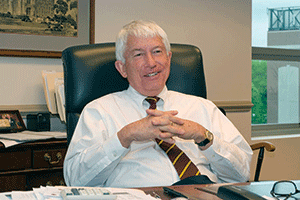Remember Signet and Crestar?
Merger recalls heady days of Virginia’s big banks
Remember Signet and Crestar?
Merger recalls heady days of Virginia’s big banks

Ray Smoot will become chairman after the merger
of Union First Market and StellarOne.
He expects more Virginia banks to combine
to better manage growing costs.
It’s been more than a decade since the last large Virginia bank was bought by an out-of-state company. Before then, a number of Old Dominion financial institutions had assets of more than $10 billion. Richmond, in fact, was a financial headquarters city, its downtown skyline dominated by Virginia banks such as Central Fidelity, Crestar and Signet.
Virginians were reminded of those heady days by the proposed $445.1 million, all-stock merger of Richmond-based Union First Market Bank and StellarOne Corp. of Charlottesville, announced in June. The merger, expected to be completed no later than May 2014, will create the largest community bank in Virginia, with assets of $7.1 billion, $5.8 billion in deposits, $5.2 billion in loans and 146 branch locations statewide, stretching from Southwest Virginia to Charlottesville, Richmond and Fredericksburg.
Retaining the Union First Market name, the publicly traded merged bank will remain headquartered in Richmond.
“In our strategic planning as we looked to the banks of size in Virginia, Stellar seemed to have the best combination of cultural fit and footprint,” Union First Market CEO G. William Beale says of the merger.
“I believe we will be a good fit for several reasons,” says StellarOne Chairman Raymond D. Smoot Jr. “We both have a long history of being community-based banks that, when brought together, cover much of the state. We will have a considerably larger lending capacity together as a $7 billion or so bank than we will have separately, which will permit us to serve larger companies and borrowers within Virginia, and we believe there are some efficiencies to be recognized by bringing together two banks that serve part of the same geography of the state.”
When the merger is complete, Beale will remain CEO, and Smoot will be chairman of the new, larger Union First Market board. Smoot and seven yet-to-be-identified members of the 13-member StellarOne board will join the merged board.
StellarOne investors stand to earn a dividend increase of more than 20 percent at the closing of the deal, due to Union First Market’s higher dividends, Smoot says, “and would anticipate that level of dividend would increase over time.”
The merged bank will close more than 10 bank branches, and there will also be some reductions to back office operations due to the consolidation, Beale says. “Attrition will take care of some of those, but it won’t take care of everything,” he says, acknowledging there will be some layoffs in the merger’s wake.
An implementation team made up of Union First Market and StellarOne employees is being put together “to look at areas where the two banks overlap and to determine where we would have undue overlap and also look at where we may need additional coverage,” Smoot says.
While it’s still too early to tell whether this merger will signal Virginia’s return as a banking powerhouse, Beale thinks it would be good for Virginia. “It would give Virginia companies of almost any size the opportunity to do more business with Virginia-based banks without having to go to the national players.”
There has been a wave of bank consolidations going on for several years across the nation, Smoot says. The trend is being driven by the higher costs of doing business because of burdensome, increased federal regulations and ballooning IT costs to keep banks technologically competitive with the latest developments in online and mobile banking. For instance, in March, Arlington-based Virginia Commerce Bank was acquired by Charleston, W.Va.-based United Bankshares Inc.
Smoot thinks it’s likely other Virginia banks will band together to manage costs: “The considerable increased regulatory requirements are impacting bottom lines unfavorably, which is leading banks to come together where they believe they can recognize savings in the management and administration of the organization.”
The larger, streamlined bank will be in a better position to deal with regulations and will be able to offer loans to larger corporate clients. Plus, the cost savings gained from reducing inefficiencies will mean that the bank won’t feel pressured to raise fees and rates on retail customers, Beale says.
The large Virginia banks (the last of which, Falls Church-based First Virginia Banks, was sold in 2003) also were known for their largesse within the commonwealth, contributing to various Virginia-based charities and sponsoring community and cultural events. Union First Market and StellarOne contribute about $2 million each year in sponsorships and donations, and Beale says the merged Union First Market likely will play an even larger role in community events and charities across Virginia.
Going forward, after the merger logistics are resolved, Union First Market will look at expanding into areas where neither bank had a large presence, such as Northern Virginia and Hampton Roads. “But first and foremost at this point,” Smoot says, “we need to ensure we organize in a way to appropriately serve the area where we’re located before considering the possibility of moving into new areas.”


















